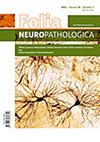在标签外使用依库珠单抗治疗神经系统症状和进行性视力丧失
IF 1.6
4区 医学
Q4 NEUROSCIENCES
引用次数: 0
摘要
我们描述了依库珠单抗治疗一名患有帕奇眼炎、左额叶炎症浸润和脑血肿的患者的结果,该患者出现了进行性视力下降、癫痫发作和补体系统参数异常。一名 30 岁的女性患者最初被诊断为嗜酸性粒细胞过多症和左眼眶肿瘤,后来出现左眼视力明显受损、右眼进行性视力下降以及癫痫发作和行为改变等神经系统症状。磁共振成像(MRI)显示,左侧额叶区硬脑膜增厚,皮层和皮层下白质轻微水肿。眼眶活检显示有非特异性炎症浸润。尽管最初反应良好,但在使用糖皮质激素和免疫抑制剂治疗期间,症状有所进展。研究发现,替代补体途径的活性增加,但其主要抑制因子H因子(FH)的水平较低,而且存在抗FH自身抗体。基因分析发现了几种补体蛋白的错义变异,包括 FH(p.H402Y)和 FI(T300A)的两种与疾病相关的突变。已尝试使用补体 C5 阻断剂 eculizumab。患者的神经系统症状有所缓解,视力下降得到抑制,实验室指标有所改善,可以停止类固醇治疗。该病例强调了补体系统失调在神经痛中的作用。本文章由计算机程序翻译,如有差异,请以英文原文为准。
Off-label use of eculizumab for neurological symptoms and progressive vision loss
We describe the results of eculizumab treatment of a patient with pachymeningitis, inflammatory infiltration of the left frontal lobe, and cerebral hematoma, who presented with progressive vision loss, epileptic seizures, and abnormal pattern of the complement system parameters. A 30-year-old female patient, initially diagnosed with hypereosinophilia and a tumour of the left orbit, developed a significant visual impairment in the left eye, progressive vision loss in the right eye, and neurological symptoms in the form of epileptic seizures and behavioural changes. Magnetic resonance imaging (MRI) revealed thickening of the dura mater in the left frontal area, slight oedema of the cortex, and subcortical white matter. Orbit biopsy showed non-specific inflammatory infiltrates. Despite the initial good response, symptoms progressed during treatment with glucocorticoids and immunosuppressants. Increased activity of the alternative complement pathway accompanied by a low level of its main inhibitor, factor H (FH), and the presence of anti-FH autoantibodies, was found. Genetic analysis revealed several missense variants of complement proteins, including two disease-linked mutations in FH (p.H402Y) and FI (T300A). An attempt to apply a complement C5 blocker, eculizumab, has been made. Neurological symptoms subsided, vision loss was inhibited, laboratory parameters improved, and discontinuation of steroid therapy was possible. The case underlines the role of complement system dysregulation in neurological distress.
求助全文
通过发布文献求助,成功后即可免费获取论文全文。
去求助
来源期刊

Folia neuropathologica
医学-病理学
CiteScore
2.50
自引率
5.00%
发文量
38
审稿时长
>12 weeks
期刊介绍:
Folia Neuropathologica is an official journal of the Mossakowski Medical Research Centre Polish Academy of Sciences and the Polish Association of Neuropathologists. The journal publishes original articles and reviews that deal with all aspects of clinical and experimental neuropathology and related fields of neuroscience research. The scope of journal includes surgical and experimental pathomorphology, ultrastructure, immunohistochemistry, biochemistry and molecular biology of the nervous tissue. Papers on surgical neuropathology and neuroimaging are also welcome. The reports in other fields relevant to the understanding of human neuropathology might be considered.
 求助内容:
求助内容: 应助结果提醒方式:
应助结果提醒方式:


